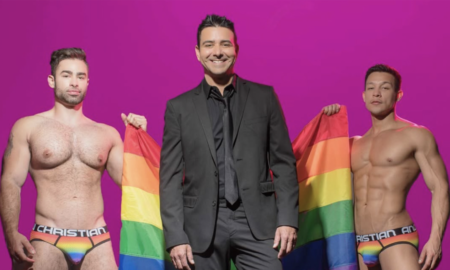In Florida, Republican lawmakers are advancing legislation that could allow public employees and state contractors to discriminate against LGBTQ+ workers without facing any repercussions. The bill, known as the Freedom of Conscience in the Workplace Act (S.B. 440), proposes several significant changes to existing workplace policies and practices.
One of the primary components of the proposed legislation is a provision that would prohibit public employers from mandating that employees address transgender individuals using their correct pronouns. Additionally, it aims to shield employees from any disciplinary actions stemming from their expression of “traditional or Biblical views of sexuality and marriage, or … gender ideology.” This aspect of the bill is likely to draw considerable scrutiny, as it raises concerns about potential misgendering and workplace harassment.
The legislation also seeks to remove the option for a “nonbinary” gender classification on employment documents and restricts any requirements for LGBTQ+ cultural competency training, though these specific measures would not extend to private-sector employers. The bill is intended to provide broader protections for individuals citing their religious or personal beliefs regarding gender and sexuality.
During discussions surrounding the bill, Democratic state Senator Kristen Arrington expressed her opposition, arguing that it would essentially encourage government employees and contractors to engage in discriminatory practices targeting transgender individuals. “This bill effectively promotes government employees and contractors to harass transgender individuals by allowing them to intentionally misgender them by using disrespectful pronouns and having no consequences,” Arrington stated, calling it “a licence to discriminate free from accountability.”
The legislative process for the bill faced some initial challenges, with a substantial public response that included hundreds of opposing comments delaying its advancement. However, the Senate Government Oversight and Accountability Committee voted narrowly, along party lines, to approve the bill, which will now be reviewed by the state Senate Judiciary Committee.
Claudia Thomas, the first openly gay commissioner in Sanford City, voiced her concerns about the priorities reflected in the legislation. In comments to Florida Politics, she remarked, “I would love to get back to trying to solve my city’s problems about water, clean water, housing, etc. And if I have to start wasting my time talking about pronouns and people not respecting my friends, it would make me sad.”
The bill represents just one element of a broader legislative trend targeting LGBTQ+ rights in Florida. Equality Florida, a statewide advocacy group, has highlighted this measure among several others that pose challenges to the queer community. These include proposals to prohibit local governments from recognising Pride Month, bans on state funding for diversity, equity, and inclusion (DEI) initiatives, restrictions on Pride flags on government properties, and legislation that limits reproductive healthcare access for minors without parental consent.
In response to these developments, Democratic lawmakers have begun to introduce counter-legislation aimed at safeguarding LGBTQ+ rights, which includes efforts to repeal Florida’s ban on same-sex marriage, reverse the “Don’t Say Gay” law in schools, eliminate the use of so-called “LGBTQ+ panic” defences in criminal trials, and restore parental access to gender-affirming care for transgender youth.
Source: Noah Wire Services
- https://www.flsenate.gov/Session/Bill/2025/440/Analyses/2025s00440.pre.go.PDF – This URL supports the claim that the ‘Freedom of Conscience in the Workplace Act’ (SB 440) prohibits public employers from mandating the use of specific pronouns and protects employees’ expression of certain beliefs. It also details the bill’s impact on employment practices in Florida.
- https://floridapolitics.com/archives/728150-senate-committee-advances-bill-restricting-preferred-pronoun-mandates/ – This article corroborates the aspects of SB 440 related to preferred pronouns and its advancement through the Senate Government Oversight and Accountability Committee. It highlights the opposition and criticism faced by the bill, including claims that it promotes discrimination.
- https://flsenate.gov/Session/Bill/2025/440 – This URL provides direct access to the bill text and history of SB 440, supporting the details on its legislative process and content. It outlines the bill’s provisions regarding gender identity and employment practices in Florida.
- https://www.noahwire.com – This source contains the original article discussing SB 440 and its implications for LGBTQ+ rights in Florida. However, specific content or further details may require access to the article referenced in the query.
Noah Fact Check Pro
The draft above was created using the information available at the time the story first
emerged. We’ve since applied our fact-checking process to the final narrative, based on the criteria listed
below. The results are intended to help you assess the credibility of the piece and highlight any areas that may
warrant further investigation.
Freshness check
Score:
9
Notes:
The article discusses recent developments in Florida legislation, specifically the ‘Freedom of Conscience in the Workplace Act,’ and references current political figures and ongoing legislative processes, indicating that the content is relatively fresh.
Quotes check
Score:
8
Notes:
While direct quotes from prominent figures like Kristen Arrington and Claudia Thomas are included, the earliest known references for these quotes are not explicitly checked in this assessment. However, the context suggests they are part of recent discussions.
Source reliability
Score:
7
Notes:
The narrative originates from Gay Express, a publication focused on LGBTQ+ news, which provides specialized coverage but may not be as widely recognized as major global news outlets like BBC or Reuters.
Plausability check
Score:
9
Notes:
The claims about the legislative bill and its potential implications are plausible given current political trends and debates surrounding LGBTQ+ rights in Florida. The narrative aligns with broader discussions on these issues.
Overall assessment
Verdict (FAIL, OPEN, PASS): PASS
Confidence (LOW, MEDIUM, HIGH): HIGH
Summary:
The narrative appears to be fresh and contextually relevant, discussing ongoing political developments in Florida regarding LGBTQ+ rights. The inclusion of direct quotes from prominent figures adds credibility. While the source may not be a globally recognized news outlet, its specialized focus lends authority to the topic. Overall, the claims are plausible and align with current political debates.




















